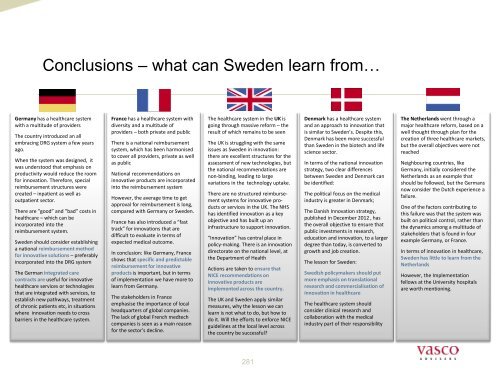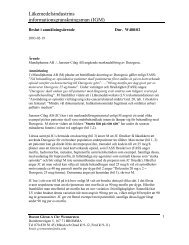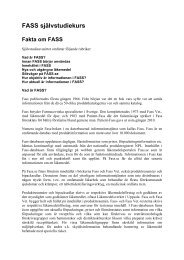Innovation in European healthcare â what can Sweden learn? - LIF
Innovation in European healthcare â what can Sweden learn? - LIF
Innovation in European healthcare â what can Sweden learn? - LIF
You also want an ePaper? Increase the reach of your titles
YUMPU automatically turns print PDFs into web optimized ePapers that Google loves.
Conclusions – <strong>what</strong> <strong>can</strong> <strong>Sweden</strong> <strong>learn</strong> from…<br />
Germany has a <strong>healthcare</strong> system<br />
with a multitude of providers<br />
The country <strong>in</strong>troduced an all<br />
embrac<strong>in</strong>g DRG system a few years<br />
ago.<br />
When the system was designed, it<br />
was understood that emphasis on<br />
productivity would reduce the room<br />
for <strong>in</strong>novation. Therefore, special<br />
reimbursement structures were<br />
created – <strong>in</strong>patient as well as<br />
outpatient sector.<br />
There are ”good” and ”bad” costs <strong>in</strong><br />
<strong>healthcare</strong> – which <strong>can</strong> be<br />
<strong>in</strong>corporated <strong>in</strong>to the<br />
reimbursement system.<br />
<strong>Sweden</strong> should consider establish<strong>in</strong>g<br />
a national reimbursement method<br />
for <strong>in</strong>novative solutions – preferably<br />
<strong>in</strong>corporated <strong>in</strong>to the DRG system<br />
The German <strong>in</strong>tegrated care<br />
contracts are useful for <strong>in</strong>novative<br />
<strong>healthcare</strong> services or technologies<br />
that are <strong>in</strong>tegrated with services, to<br />
establish new pathways, treatment<br />
of chronic patients etc, <strong>in</strong> situations<br />
where <strong>in</strong>novation needs to cross<br />
barriers <strong>in</strong> the <strong>healthcare</strong> system.<br />
France has a <strong>healthcare</strong> system with<br />
diversity and a multitude of<br />
providers – both private and public<br />
There is a national reimbursement<br />
system, which has been harmonised<br />
to cover all providers, private as well<br />
as public<br />
National recommendations on<br />
<strong>in</strong>novative products are <strong>in</strong>corporated<br />
<strong>in</strong>to the reimbursement system<br />
However, the average time to get<br />
approval for reimbursement is long,<br />
compared with Germany or <strong>Sweden</strong>.<br />
France has also <strong>in</strong>troduced a “fast<br />
track” for <strong>in</strong>novations that are<br />
difficult to evaluate <strong>in</strong> terms of<br />
expected medical outcome.<br />
In conclusion: like Germany, France<br />
shows that specific and predictable<br />
reimbursement for <strong>in</strong>novative<br />
products is important, but <strong>in</strong> terms<br />
of implementation we have more to<br />
<strong>learn</strong> from Germany.<br />
The stakeholders <strong>in</strong> France<br />
emphasise the importance of local<br />
headquarters of global companies.<br />
The lack of global French medtech<br />
companies is seen as a ma<strong>in</strong> reason<br />
for the sector’s decl<strong>in</strong>e.<br />
The <strong>healthcare</strong> system <strong>in</strong> the UK is<br />
go<strong>in</strong>g through massive reform – the<br />
result of which rema<strong>in</strong>s to be seen<br />
The UK is struggl<strong>in</strong>g with the same<br />
issues as <strong>Sweden</strong> <strong>in</strong> <strong>in</strong>novation:<br />
there are excellent structures for the<br />
assessment of new technologies, but<br />
the national recommendations are<br />
non-b<strong>in</strong>d<strong>in</strong>g, lead<strong>in</strong>g to large<br />
variations <strong>in</strong> the technology uptake.<br />
There are no structured reimbursement<br />
systems for <strong>in</strong>novative products<br />
or services <strong>in</strong> the UK. The NHS<br />
has identified <strong>in</strong>novation as a key<br />
objective and has built up an<br />
<strong>in</strong>frastructure to support <strong>in</strong>novation.<br />
“<strong>Innovation</strong>” has central place <strong>in</strong><br />
policy-mak<strong>in</strong>g. There is an <strong>in</strong>novation<br />
directorate on the national level, at<br />
the Department of Health<br />
Actions are taken to ensure that<br />
NICE recommendations on<br />
<strong>in</strong>novative products are<br />
implemented across the country.<br />
The UK and <strong>Sweden</strong> apply similar<br />
measures, why the lesson we <strong>can</strong><br />
<strong>learn</strong> is not <strong>what</strong> to do, but how to<br />
do it. Will the efforts to enforce NICE<br />
guidel<strong>in</strong>es at the local level across<br />
the country be successful?<br />
Denmark has a <strong>healthcare</strong> system<br />
and an approach to <strong>in</strong>novation that<br />
is similar to <strong>Sweden</strong>’s. Despite this,<br />
Denmark has been more successful<br />
than <strong>Sweden</strong> <strong>in</strong> the biotech and life<br />
science sector.<br />
In terms of the national <strong>in</strong>novation<br />
strategy, two clear differences<br />
between <strong>Sweden</strong> and Denmark <strong>can</strong><br />
be identified:<br />
The political focus on the medical<br />
<strong>in</strong>dustry is greater <strong>in</strong> Denmark;<br />
The Danish <strong>Innovation</strong> strategy,<br />
published <strong>in</strong> December 2012 , has<br />
the overall objective to ensure that<br />
public <strong>in</strong>vestments <strong>in</strong> research,<br />
education and <strong>in</strong>novation, to a larger<br />
degree than today, is converted to<br />
growth and job creation.<br />
The lesson for <strong>Sweden</strong>:<br />
Swedish policymakers should put<br />
more emphasis on translational<br />
research and commercialisation of<br />
<strong>in</strong>novation <strong>in</strong> <strong>healthcare</strong><br />
The <strong>healthcare</strong> system should<br />
consider cl<strong>in</strong>ical research and<br />
collaboration with the medical<br />
<strong>in</strong>dustry part of their responsibility<br />
The Netherlands went through a<br />
major <strong>healthcare</strong> reform, based on a<br />
well thought through plan for the<br />
creation of three <strong>healthcare</strong> markets,<br />
but the overall objectives were not<br />
reached<br />
Neighbour<strong>in</strong>g countries, like<br />
Germany, <strong>in</strong>itially considered the<br />
Netherlands as an example that<br />
should be followed, but the Germans<br />
now consider the Dutch experience a<br />
failure.<br />
One of the factors contribut<strong>in</strong>g to<br />
this failure was that the system was<br />
built on political control, rather than<br />
the dynamics among a multitude of<br />
stakeholders that is found <strong>in</strong> four<br />
example Germany, or France.<br />
In terms of <strong>in</strong>novation <strong>in</strong> <strong>healthcare</strong>,<br />
<strong>Sweden</strong> has little to <strong>learn</strong> from the<br />
Netherlands<br />
However, the Implementation<br />
fellows at the University hospitals<br />
are worth mention<strong>in</strong>g.<br />
281
















